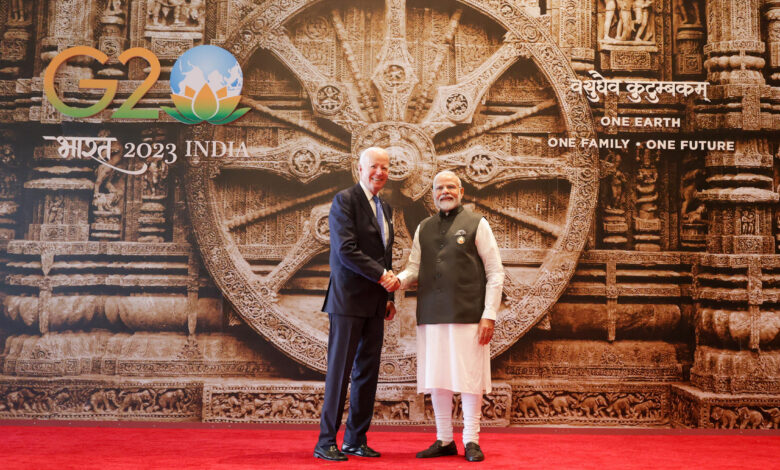India and United States Issue Joint Statement, Strengthening Bilateral Ties and Global Cooperation

New Delhi, India – In a significant development, India and the United States have reaffirmed their close and enduring partnership through a joint statement issued during President Joseph R. Biden Jr.’s visit to India. The statement underscores the substantial progress made in implementing the landmark achievements resulting from Prime Minister Narendra Modi’s historic visit to Washington in June 2023.
The leaders expressed their commitment to further enhance the India-U.S. Strategic Partnership across all dimensions of their global agenda, emphasizing the importance of trust and mutual understanding. Shared values such as freedom, democracy, human rights, inclusion, pluralism, and equal opportunities for all citizens were highlighted as critical elements contributing to the success of both countries and strengthening their relationship.
President Biden commended India’s G20 Presidency for delivering significant outcomes, emphasizing the importance of the G20 as a platform for addressing global challenges. The leaders reiterated their dedication to the G20’s goals of promoting sustainable development, enhancing multilateral cooperation, and building consensus on inclusive economic policies. They also pledged to reshape and expand multilateral development banks to address shared challenges effectively.
The Quad, aimed at supporting a free, open, inclusive, and resilient Indo-Pacific, was reaffirmed by Prime Minister Modi and President Biden. India welcomed the United States’ decision to co-lead the Indo-Pacific Oceans Initiative (IPOI) Pillar on Trade Connectivity and Maritime Transport. Additionally, both nations are committed to increasing cooperation in planetary defense to safeguard Earth and space assets from asteroids and near-Earth objects.
In terms of technology cooperation, the leaders emphasized the pivotal role of technology in strengthening their strategic partnership. Efforts through the India-U.S. Initiative on Critical and Emerging Technology (iCET) were lauded, with plans for a midterm review in September 2023 and an annual review co-led by the National Security Advisors of both countries in early 2024.
President Biden acknowledged India’s achievements in space exploration, congratulating Prime Minister Modi and the Indian Space Research Organisation (ISRO) for Chandrayaan-3’s landing on the Moon’s south polar region and the launch of India’s first solar mission, Aditya-L1. Collaboration between ISRO and NASA for a joint effort to the International Space Station in 2024 and a strategic framework for human space flight cooperation by the end of 2023 were announced.
The leaders underscored the importance of building resilient global semiconductor supply chains. Several U.S. companies, including Microchip Technology, Inc., and Advanced Micro Devices, have committed significant investments in India. They also welcomed initiatives to strengthen telecommunications, supply chains, and digital inclusion, culminating in an MoU between Bharat 6G Alliance and Next G Alliance.
Both leaders expressed support for enhancing bilateral cooperation in the quantum domain, with a focus on the Quantum Entanglement Exchange and the involvement of India’s S.N. Bose National Centre for Basic Sciences. Collaboration in biotechnology and biomanufacturing innovations, semiconductor research, and next-generation communication systems were also highlighted.
The leaders recommitted to promoting technology sharing and co-development, along with facilitating technology transfer opportunities between Indian and U.S. industry, government, and academic institutions. They acknowledged the importance of closing the gender digital divide and supporting the Women in the Digital Economy Initiative.
Prime Minister Modi and President Biden vowed to deepen the India-U.S. Major Defense Partnership, particularly in emerging domains such as space and AI, and accelerate defense industrial collaboration. This includes a commercial agreement between GE Aerospace and Hindustan Aeronautical Limited (HAL) for manufacturing GE F-414 jet engines in India.
The statement also covered initiatives related to renewable energy, electric mobility, and the settlement of WTO disputes. The leaders highlighted the significance of advancing innovation and academic partnerships, as well as their commitment to cancer research, prevention, control, and management.
Lastly, both leaders expressed their commitment to a strong and enduring India-U.S. partnership that serves the global good and contributes to a free, open, inclusive, and resilient Indo-Pacific.
This joint statement underscores the strengthening of India-U.S. ties and their collaborative efforts to address global challenges.




